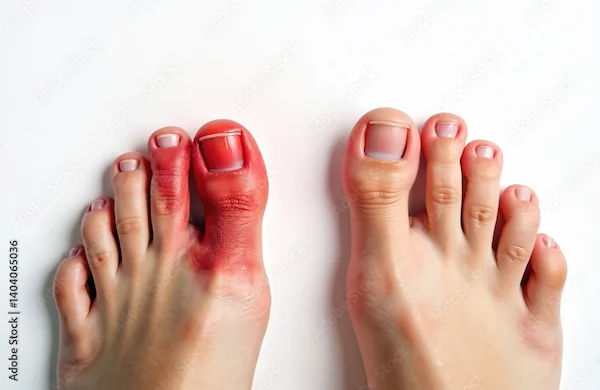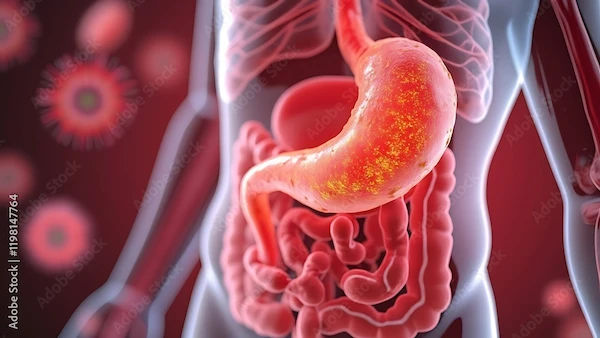Causes of Acid Reflux Explained
Discover the common causes of acid reflux and simple tips to manage symptoms like heartburn. Learn how diet, lifestyle, and medical conditions play a role.

Written by Dr. M L Ezhilarasan
Reviewed by Dr. Dhankecha Mayank Dineshbhai MBBS
Last updated on 3rd Aug, 2025

Acid reflux, also known as heartburn or gastroesophageal reflux disease (GERD), is a common condition that affects millions of people. If you’ve ever felt a burning sensation in your chest after eating or experienced a sour taste in your mouth, you might be familiar with it. But what exactly causes acid reflux? Let’s break it down in simple terms.
What Is Acid Reflux?
Acid reflux happens when stomach acid flows back up into your esophagus (the tube connecting your mouth and stomach). Normally, a muscle called the lower esophageal sphincter (LES) acts like a valve, keeping stomach acid where it belongs. But when this muscle weakens or relaxes at the wrong time, acid can escape, causing discomfort.
Common Causes of Acid Reflux
Understanding what triggers acid reflux can help you manage it better. Here are the most common causes:
1. Dietary Triggers
Certain foods and drinks can relax the LES or increase stomach acid, leading to reflux. Common culprits include:
Spicy foods (chili peppers, hot sauces)
Fatty or fried foods (burgers, fries, pizza)
Citrus fruits (oranges, lemons, tomatoes)
Chocolate (contains caffeine and other compounds that relax the LES)
Coffee and tea (caffeine can trigger reflux)
Carbonated drinks (sodas, sparkling water)
Alcohol (especially wine and beer)
Tip: Keep a food diary to track which foods worsen your symptoms.
2. Overeating or Eating Late at Night
Eating large meals puts extra pressure on your stomach, forcing acid upward. Lying down right after eating (especially within 2–3 hours) makes it easier for acid to flow back into your esophagus.
Tip: Eat smaller, more frequent meals and avoid lying down immediately after eating.
3. Obesity or Excess Weight
Extra belly fat can push on your stomach, increasing pressure on the LES and causing acid to leak into the esophagus.
Tip: Losing even a small amount of weight can help reduce symptoms.
4. Hiatal Hernia
A hiatal hernia occurs when part of the stomach pushes up through the diaphragm (the muscle separating the chest and abdomen). This can weaken the LES, making reflux more likely.
Tip: If you suspect a hiatal hernia, consult a doctor for proper diagnosis and treatment.
5. Pregnancy
Hormonal changes and pressure from the growing baby can relax the LES, leading to acid reflux in many pregnant women.
Tip: Eating smaller meals, avoiding trigger foods, and sleeping with your head elevated can help.
6. Smoking
Smoking weakens the LES and reduces saliva production, which normally helps neutralize stomach acid.
Tip: Quitting smoking can improve reflux symptoms and overall health.
7. Certain Medications
Some medicines can relax the LES or irritate the esophagus, including:
Pain relievers (ibuprofen, aspirin)
Blood pressure medications (calcium channel blockers)
Sedatives and antidepressants
Tip: If you suspect your medication is causing reflux, talk to your doctor—they may adjust your prescription.
Consult a Top Gastroentrologist for the best advice
8. Stress and Anxiety
While stress doesn’t directly cause acid reflux, it can worsen symptoms by increasing stomach acid production and making you more sensitive to discomfort.
Tip: Practice relaxation techniques like deep breathing, yoga, or meditation.
How to Manage Acid Reflux
While occasional heartburn is normal, frequent reflux can damage your esophagus over time. Here are some ways to manage it:
Lifestyle Changes
Elevate your head while sleeping (use an extra pillow or a wedge pillow).
Avoid tight clothing (belts, waistbands that squeeze your stomach).
Chew gum (increases saliva, which helps neutralize acid).
Dietary Adjustments
Eat slowly and chew thoroughly.
Avoid late-night snacks.
Choose reflux-friendly foods like oatmeal, bananas, ginger, and lean proteins.
When to See a Doctor
If you experience:
Frequent heartburn (more than twice a week)
Difficulty swallowing
Unexplained weight loss
Persistent nausea or vomiting
…it’s time to consult a doctor. Untreated GERD can lead to complications like esophagitis or Barrett’s esophagus.
Need Help? Apollo 24|7 Can Assist!
If acid reflux is affecting your daily life, Apollo 24|7 offers expert consultations and diagnostic tests to help you find relief. You can:
Book a doctor’s appointment online
Get dietary advice from nutritionists
Order prescribed medications for GERD
Managing acid reflux starts with understanding its causes. By making small changes in your diet and lifestyle, you can reduce discomfort and improve your digestive health.
Conclusion
Acid reflux can stem from common triggers like food, lifestyle habits, and underlying health issues. Fortunately, many symptoms can be managed with small changes such as mindful eating, weight control, and avoiding late-night meals. For persistent or severe reflux, consulting a gastroenterologist is the best step toward long-term relief and better digestive health.
Consult a Top Gastroentrologist for the best advice
Consult a Top Gastroentrologist for the best advice

Dr. Amit Pandita
Gastroenterology/gi Medicine Specialist
10 Years • MBBS. MD (INTERNAL MEDICINE) DrNB (GASTROENTEROLOGY AND HEPATOLOGY)
Delhi
Apollo Hospitals Indraprastha, Delhi

Dr. Sunil Kaul
General Surgeon
30 Years • MBBS, MS, FICS, FIMSA, FMAS
Delhi
Apollo Hospitals Indraprastha, Delhi
(25+ Patients)

Dr Piyush Vishwakarma
Gastroenterology/gi Medicine Specialist
11 Years • MBBS, MD, DrNB,
Delhi
Apollo Hospitals Indraprastha, Delhi

Dr. Ankit Vijay Agarwal
Gastroenterology/gi Medicine Specialist
14 Years • MBBS(Osmania), DNB(Internal Medicine ), DM ( Osmania) Consultant Gastroenterologist, Hepatologist and Advanced Therapeutic Endoscopist
Hyderabad
Apollo Hospitals Jubilee Hills, Hyderabad

Dr. Aakash Garg
Gastroenterology/gi Medicine Specialist
12 Years • MBBS, DNB (Medicine), DrNB (Gastroentrology).
Bilaspur
Apollo Hospitals Seepat Road, Bilaspur
(125+ Patients)




